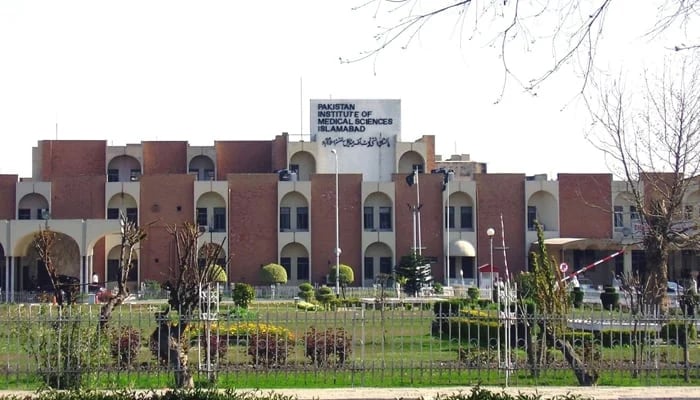Young man dies due to rare infection in Islamabad
ISLAMABAD: Two cases of an ‘extremely rare’ infectious disease have been reported from the federal capital where a 23-year-old man was killed by Leptospirosis while a woman survived the infection following treatment at the Pakistan Institute of Medical Sciences (PIMS) Islamabad, officials said.
“A 23-year old man, a resident of Khanna Pul area of Islamabad has died due to Leptospirosis while a lady from Murree survived the infection and is currently in good health. This is a rare bacterial disease and we don’t usually see Leptospirosis cases in Pakistan”, Prof. Dr. Nasim Akhtar, head of the infectious diseases department told The News.
Leptospirosis is an important but overlooked zoonotic and waterborne disease caused by the bacterium Leptospira that is emerging as a global public threat due to morbidity and mortality observed in both animals and humans. “The outbreaks are typically related to floods following monsoon rains, during which Leptospiras are washed off in contaminated soil and often settle in water bodies”, Dr. Nasim Akhtar said.
The disease is so rare that PCR test for the detection and confirmation of the bacterium Leptospira is not available in Pakistan while the Leptospira antibody test is also not available at both PIMS and even at the National Institute of Health (NIH) Islamabad. Dr Nasim Akhtar said after clinical diagnosis of Leptospirosis in both patients, they sent their samples to the Armed Forces Institute of Pathology for the confirmation of bacterial infection and a ‘four-fold rise in the Leptospira antibodies’ confirmed the infection by the extremely rare pathogen. To a query, she said the disease Leptospirosis is treatable with available antibiotics but called for the availability of Leptospira PCR and antibodies test at the PIMS and NIH Islamabad so that timely detection and confirmation could help the physicians in treating and saving lives of the infected people. She claimed that both the patients had ‘ischemic changes’ in the legs and face and gangrene-like wounds in their hands and feet, which was quite unusual in the case of Leptospira infection.
On the other hand, officials at NIH Islamabad also confirmed that they did not have the facility to detect Leptospira antibodies, saying they never received any request from public health authorities with a suspected case. “Antibody can be detected by a common technique called ELISA. PIMS can procure kits as they must have ELISA equipment and run the test themselves. NIH as a matter of fact is required to carry out public health testing and advance tests”, an official at the NIH said. The NIH official also confirmed that no confirmed case of Leptospirosis had been brought into their knowledge by the officials at PIMS, saying it is a ‘very rarely diagnosed’ disease.
Infectious disease experts at other leading health facilities including Aga Khan University Hospital (AKUH) Karachi, Shaukat Khanum Memorial Hospital (SKMH) Lahore and Sindh Infectious Diseases Hospital (SIDH) Karachi said they had not seen any case of Leptospirosis at their centres. “I want to know the lab (which is doing Leptospira antibodies test) as I had a patient I suspected it on but didn’t have the test”, Dr Faisal Mehmood, head of infectious diseases at AKUH said.
Commenting on the reported cases of Leptospirosis in Islamabad, renowned epidemiologist Dr Rana Jawad Asghar said there should be a complete ‘epidemiological investigation’ of this reported disease as the probability of Leptospirosis cases was ‘very rare’ in Pakistan.
-
 Everything We Know About Jessie J's Breast Cancer Journey
Everything We Know About Jessie J's Breast Cancer Journey -
 Winter Olympics 2026: What To Watch In Men’s Hockey Today
Winter Olympics 2026: What To Watch In Men’s Hockey Today -
 Winnie Harlow Breaks Vitiligo Stereotypes: 'I'm Not A Sufferer'
Winnie Harlow Breaks Vitiligo Stereotypes: 'I'm Not A Sufferer' -
 Apple Martin Opens Up About Getting 'crazy' Lip Filler
Apple Martin Opens Up About Getting 'crazy' Lip Filler -
 Why Did OpenAI Remove One Crucial Word From Its Mission Statement?
Why Did OpenAI Remove One Crucial Word From Its Mission Statement? -
 Prince William Warned His Future Reign Will Be Affected By Andrew Scandal
Prince William Warned His Future Reign Will Be Affected By Andrew Scandal -
 Amy Madigan Reflects On Husband Ed Harris' Support After Oscar Nomination
Amy Madigan Reflects On Husband Ed Harris' Support After Oscar Nomination -
 Is Studying Medicine Useless? Elon Musk’s Claim That AI Will Outperform Surgeons Sparks Debate
Is Studying Medicine Useless? Elon Musk’s Claim That AI Will Outperform Surgeons Sparks Debate -
 Margot Robbie Gushes Over 'Wuthering Heights' Director: 'I'd Follow Her Anywhere'
Margot Robbie Gushes Over 'Wuthering Heights' Director: 'I'd Follow Her Anywhere' -
 'The Muppet Show' Star Miss Piggy Gives Fans THIS Advice
'The Muppet Show' Star Miss Piggy Gives Fans THIS Advice -
 Sarah Ferguson Concerned For Princess Eugenie, Beatrice Amid Epstein Scandal
Sarah Ferguson Concerned For Princess Eugenie, Beatrice Amid Epstein Scandal -
 Uber Enters Seven New European Markets In Major Food-delivery Expansion
Uber Enters Seven New European Markets In Major Food-delivery Expansion -
 Hollywood Fights Back Against Super-realistic AI Video Tool
Hollywood Fights Back Against Super-realistic AI Video Tool -
 Meghan Markle's Father Shares Fresh Health Update
Meghan Markle's Father Shares Fresh Health Update -
 Pentagon Threatens To Cut Ties With Anthropic Over AI Safeguards Dispute
Pentagon Threatens To Cut Ties With Anthropic Over AI Safeguards Dispute -
 Samsung Galaxy Unpacked 2026: What To Expect On February 25
Samsung Galaxy Unpacked 2026: What To Expect On February 25




